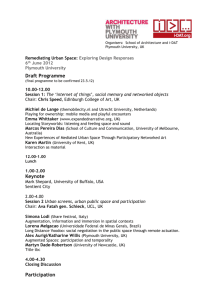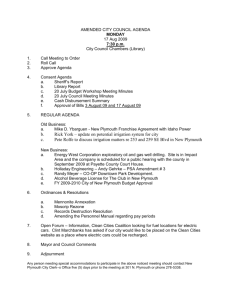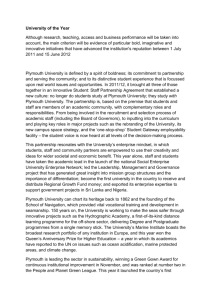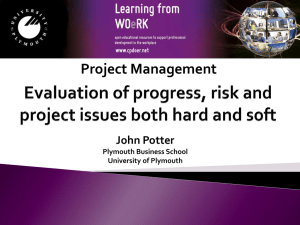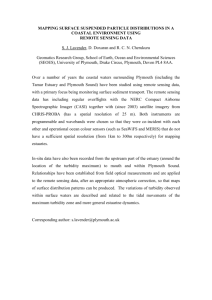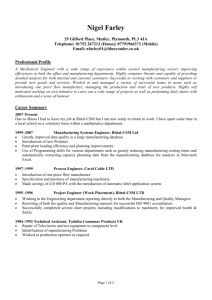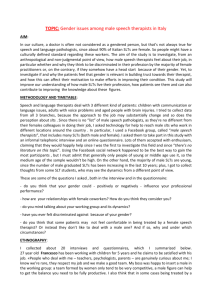here
advertisement
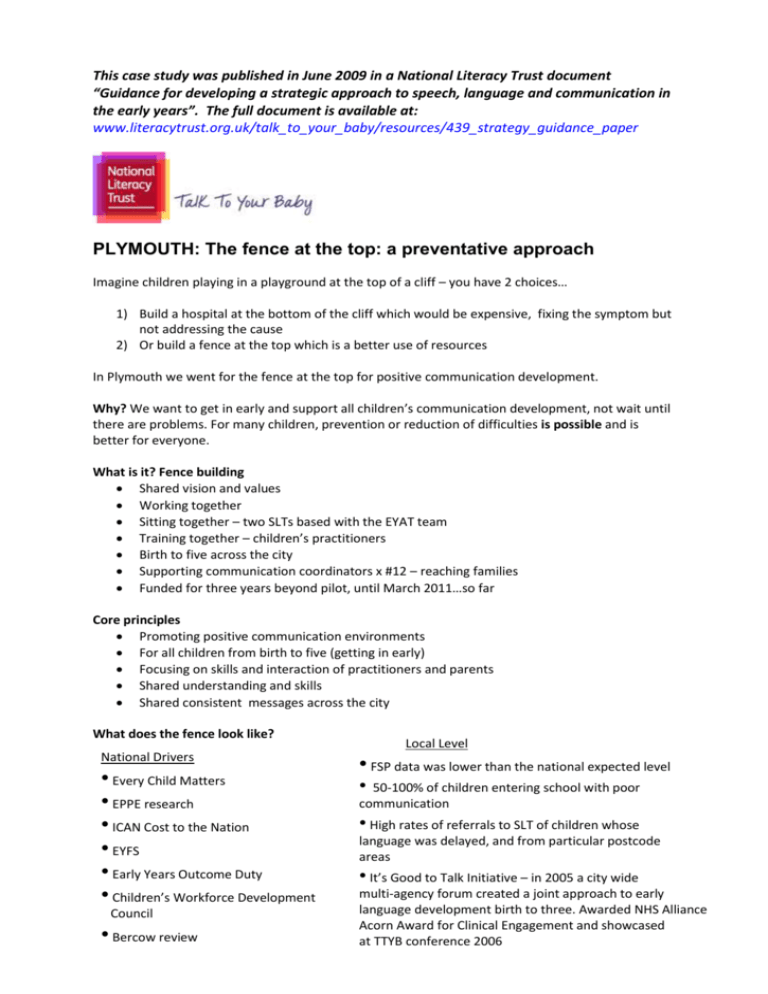
This case study was published in June 2009 in a National Literacy Trust document “Guidance for developing a strategic approach to speech, language and communication in the early years”. The full document is available at: www.literacytrust.org.uk/talk_to_your_baby/resources/439_strategy_guidance_paper PLYMOUTH: The fence at the top: a preventative approach Imagine children playing in a playground at the top of a cliff – you have 2 choices… 1) Build a hospital at the bottom of the cliff which would be expensive, fixing the symptom but not addressing the cause 2) Or build a fence at the top which is a better use of resources In Plymouth we went for the fence at the top for positive communication development. Why? We want to get in early and support all children’s communication development, not wait until there are problems. For many children, prevention or reduction of difficulties is possible and is better for everyone. What is it? Fence building Shared vision and values Working together Sitting together – two SLTs based with the EYAT team Training together – children’s practitioners Birth to five across the city Supporting communication coordinators x #12 – reaching families Funded for three years beyond pilot, until March 2011…so far Core principles Promoting positive communication environments For all children from birth to five (getting in early) Focusing on skills and interaction of practitioners and parents Shared understanding and skills Shared consistent messages across the city What does the fence look like? National Drivers • Every Child Matters • EPPE research • ICAN Cost to the Nation • EYFS • Early Years Outcome Duty • Children’s Workforce Development Council • Bercow review Local Level • FSP data was lower than the national expected level • 50-100% of children entering school with poor communication • High rates of referrals to SLT of children whose language was delayed, and from particular postcode areas • It’s Good to Talk Initiative – in 2005 a city wide multi-agency forum created a joint approach to early language development birth to three. Awarded NHS Alliance Acorn Award for Clinical Engagement and showcased at TTYB conference 2006 •Sure Start local programmes 2001-2007 aspects trialed by SLTs informed the fence • Research by Educational Psychologists in Plymouth in 2005 – children in seven children's centres were assessed on language and behavioural scales, teachers and practitioners from each setting were trained to support communication development using the Elklan ten week course. Post training the children were reassessed and found to have improved significantly, in some cases up by 22 months in a ten month period. This demonstrates that when the workforce has a better understanding of how language works, and how to support it in practice, there is a great effect on the children they work with – for communication, language and behaviour. Who makes it work? It is very important to identify and involve key stakeholders at a strategic level to endorse decisions, and at an operational level to make it happen. Key stakeholders include: Plymouth City Council NHS Plymouth (PCT) Private and Voluntary agencies (Third Sector) Director of Health Services for Children and Families Head of Speech and Language Services Head of Early Years Education Clinical and Professional Lead (Community Public Health Nursing) Operation Level: Early Years Advisory Teachers (EYAT) Inclusion Advisory Services Children’s centres Early years practitioners SLTs and SLTAs Health Visitors Midwives Library Service Childminders Educational Psychologists What makes it work? •Shared concern – there was already a network of people across Plymouth who recognised the impact of poor communication skills and wanted to do something about it – this gave motivation and reason to support the work at all levels • Shared messages – Agreed by all stakeholders – this means that every practitioner and every parent hears the same messages in the same ways – stay focused • High national profile opportunities – e.g. conferences and awards – this helps strategic bodies to support the work • Taking time and problem solving– it takes time to develop, to get everyone on board, understanding why the messages and priorities are there, to create a message that suits everyone involved. Bringing about change to a different way of working feels risky, people need time and support to adjust and progress • Willingness to work together – agencies and children’s centres were able to set aside their individual interests to serve one whole, more effective ‘fence’ – they needed to understand the long term benefits of doing this • Quality assurance INTERNAL – built into standard provision e.g. communication training in EY settings, registration criteria, health visitors audited to give out TTYB information through service standards EXTERNAL – heightens the profile at strategic level – e.g. I CAN Early Talk accreditation, Every Child A Talker (we will be third wave) • Launch – high profile in the city, to launch the idea at the start and then to remind and keep it running • Committed people – find people in each agency who understand and can speak up. Everyone involved really cares about the issues and are signed up to the work What do we say? Shared messages •“It’s Good to Talk ….and Listen with Babies and Children in Plymouth” • Traffic lights of interaction (by kind permission of Elklan) – for parents and practitioners Stop Watch & Listen Respond • TTYB leaflets e.g. Talking Tips given out at first post birth visit by health visitors • Interaction tips in all HV ‘Red books’ • Blast – every setting trained to carry out the Blast programme • Communication Training package – to be monitored using SCLF – delivered by EYATs. All EY settings receive same set of training including Elklan at different levels. All EYAT training goes through a ‘language sieve’ to make sure language opportunities are maximised whatever the topic e.g. in maths, dance • Children’s Centres – Communication coordinators (see later) for parents – consistent messages across all e.g. Talk to Your Bump session, Talk to Your Baby session, Chatterbox group, Baby Talk group (see later for some of these examples) • Chatterbox monkey is used to indicate anything that happens across the city that is to do with communication How do we do it? Communication coordinators • One in each Children’s Centre – 12 out of 16 so far • Variety of experience – e.g. early years workers, portage • Following a model from Plymouth Sure Starts – those were SLTs, these are not. • Main role to share messages about early communication and how to support it – with families • Called coordinators as they are enabling the whole team in a children's centre to be talking to parents about communication – it is not meant to be the sole responsibility of this worker. e.g. they help the team to look at all their activities e.g. lunch bunch, buggy walks and maximise communication messages and opportunities •Through groups, displays, campaigns, TTYB material, resources – they are always around parents and are equipped to talk about supporting early communication development • They use a variety of topics e.g. books, routines, messy play, outdoors and it involves other agencies too e.g. helping to create a booklet with Plymouth Bookstart – Rhymetimes Rock, that has tips especially for parents with babies • The role of the SLTs is to support the team of communication coordinators and bring them together to receive extra input, swap ideas, and have shared messages in each children's centre. It also means less re-inventing of the wheel as resources and ideas are planned together and shared. The children's centre managers have reported that communication is the topic that is most effectively cascaded/coordinated across the city. The communication coordinators’ confidence and skills have grown as they have tried out new skills e.g. presented at a citywide conference and running workshops for parents • They are also trained to run certain groups/sessions which are consistent across the city e.g. Talk to Your Bump, Talk to Your Baby (a session for parents with young babies), Chatterbox How do we do it? Talk to your bump A session within Great Expectations, an eight week antenatal course run by midwives, health visitors and others. The Talk to Your Bump session is about earliest communication before birth and immediately following, and the essential link between attachment and communication. It was written and trialed by Sure Start SLTs and uses material from ‘Your Bump and Beyond’ a pack developed by SLTs and midwives in Wales. It is an interactive session with quizzes, video clips etc. SLTs are not available to run this session in all the children's centres. So the session has been cascaded. Training sessions are run, to train up communication coordinators and other workers in children’s centres, to run it in pairs. The training session includes the content and why the content is there, how to put information across and how to manage workshops. So far over 40 workers in children's centres have been trained to run it. The benefits of this method: •Every children's centre in the city runs the same session •Every parent has access to the same information, which ever children’s centre they go to, ensuring equity and reducing inequality •Parents who might have travelled across the city now choose to go to their local Children’s Centre •The skill and understanding of workers is raised – there are more workers across the city who understand about very early communication and the importance of attachment and can explain it •More parents can find out that their babies are born able to communicate, and that they can prepare for this while they have a bump. We make sure we include fathers and grandparents in this too. When we say getting in early – we mean it! Feedback from parents: “I can now see that my baby is already a person and I can start getting to know him now” “I never realised how developed a newborn is” “It is really useful knowing how to express myself and have good communication with my baby” Feedback from a communication coordinator: “ When I ran a post natal group, I could tell which parents had attended the Talk to Your Bump session by how confident they were interacting with their baby, chatting more, tuned in, and one had even been to the library already to get baby books!” How do we do it? Chatterbox groups •Health visitor clinics with a play session – originally set up by local Sure Start programmes – currently up for a regional award • Chatterbox monkey is used to indicate anything that happens across the city that is to do with communication • Strong communication focus and messages – activities, stories, snack time and posters etc are all around communication and it is another opportunity to spread the word and model ideas • Joint working –- because it is a health visitor weigh in clinic parents come who might not otherwise come to a children's centre. Health visitors find that parents stay longer than they might do because of the play workers and family workers • Principles and aims agreed across the city • Quality Assurance: other toddler groups were being set up and calling themselves Chatterbox without the key ingredients, or health visitors were left without any extra workers. Representatives from all the Chatterbox groups in the city met, including parents, and agreed values, ingredients and quality markers of a Chatterbox group. A regular working party maintains these • Qualities of group matched to Every Child Matters outcomes for children's centres – leaders then keen to support it How do we know it works? ICAN Early Talk – 17 settings have so far received the accreditation, following our training package and support Blast programme - qualitative data from groups across the city Educational psychologists – qualitative research on these SLT roles SLT service – types and number of referrals monitored EYFSP data – CLLD aspects particularly Families – qualitative data of responses, and numbers of those attending What next? Summary We need to maintain quality and evaluation for practice, groups and messages. We will be introducing Every Child A Talker into our fence in April 2010. We need to maintain our close working links with the community paediatric SLT service. We need to extend the number of people who hear and understand the messages. The project works because there is such a mutual respect between agencies and we are all willing to share knowledge with each other and learn from each other. It is a privilege to be part of such effective joint working. Communication is now at the top of the agenda in Plymouth Early Years – we all know it is important but it is easy to keep it implicit – this approach is making everyone aware and able to do something about it. We want everyone in Plymouth, all parents, families and practitioners, to be excited about communication development, informed about how to support it and working together to give every child the best communication skills possible. Alice Thornton and Joanne Meade Speech and language therapists Early Years training and support Promoting positive communication environments For every child From birth to five Focusing on skills and interaction of practitioners Training: • Running training jointly with EYAT & IAS teams e.g. Blast, Elklan, Communicating Matters, Treasure Baskets, EAL, Letters and Sounds • Implementation of the EYFS • Inputting language ideas into other EYAT training Children's Centres: • Supporting Communication Coordinators • To help develop and implement these posts • Regular meetings • A coordinated city wide approach • Shared messages across the city • To liaise with CC leaders • To link with QTs Links between agencies: • To offer ideas to EYAT team • To take ideas & information to and from SLT team • Liaise about Blast • Birth to 3 forum • ICAN Early Talk Input to Whole settings - available to all in city e.g. • Baby Talk 0-3s - for workers • More informal, tailored input and support to embed training Links between agencies: • To offer ideas to EYAT team • To take ideas & information to and from SLT team • Liaise about Blast • Birth to three forum • I CAN Early Talk We are NOT: • There to treat children • There just for those with difficulties To contact us: tel 01752 307130 Email: Joanne.meade@plymouth.gov.uk Alice.thornton@plymouth.gov.uk Toolkit designed by: Gaye Powell, Head of Speech and Language, and Alice Thornton, Specialist Early Years SLT
